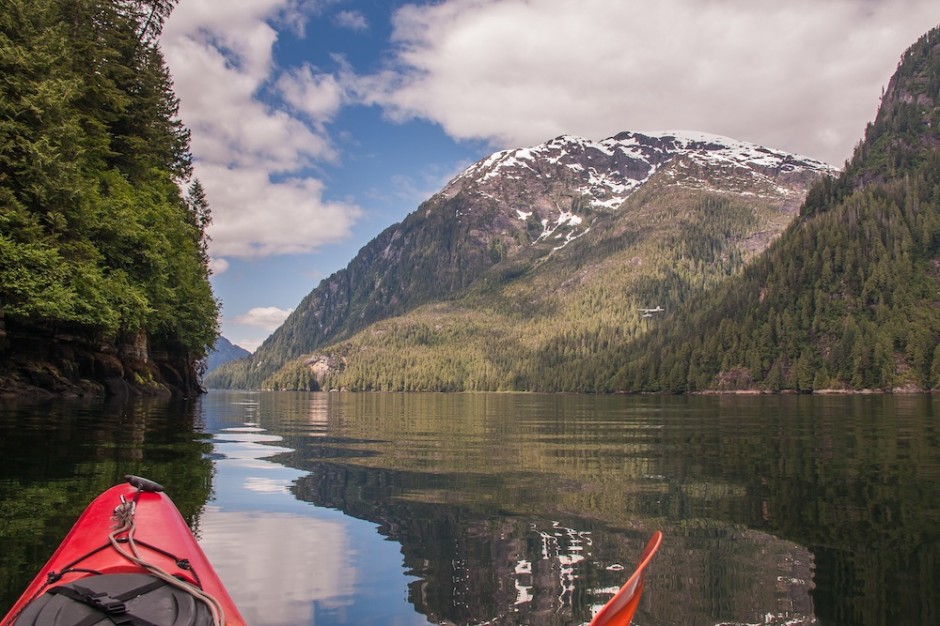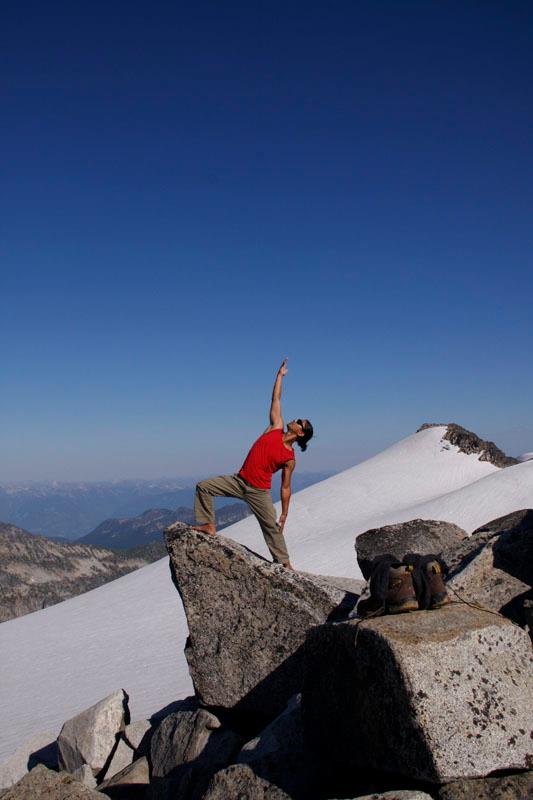GETTING IN TOUCH with the natural world where I live, in the mountains of British Columbia, isn’t very difficult. I just need to step out of my house. But for most of my life, I’ve lived in big cities, where it can be more challenging. Sometimes all it takes, though, is a little shift in perspective. Whether you live in the concrete jungle or out in the sticks, these tips still apply.
1. Look up.
The bright lights of the city can make stargazing difficult, but on a clear night, you’ll always be able to at least make out some constellations like the Big Dipper (or the Southern Cross for those on the other side of the equator). Stars are a good reminder of our place within the universe, and contemplating how small we are in the grand scheme of things can be humbling and put things into perspective. Suddenly the trivial “problems” we have don’t seem so problematic.
If it’s cloudy, lie on your back and watch the clouds change form and drift in and out of your field of vision. Self-check: Despite all the latest technologies we have, we still cannot control the weather. (Note: I didn’t say we can’t affect the weather.)
2. Look down.
I once read that if all the insects on Earth suddenly disappeared, within 50 years all life would become extinct; and that if all humans suddenly disappeared, all life would flourish. This really drives home the importance of these little creatures crawling around on the ground and buzzing around our ears. Getting in touch with nature means appreciating living beings for what they are and for their role in Life. Have you ever sat and watched a colony of ants going about its business? Did you know that if an ant dies another ant will come pick up the dead body and carry it away?
A testament to the power of Nature is how plants, those seemingly fragile organisms, grow through little cracks in rock and concrete, breaking apart the stone as they grow. It’s a futile exercise to try to keep paving over the Earth; in the end, nature always wins out. Next time you’re out walking around, pay attention to what’s growing under your feet.
3. Do some yoga.
It’s easy to take our bodies for granted. In one of the first yoga classes I took, the teacher talked about how we tend to think of our bodies simply as vehicles for moving our heads around. It painted a funny, but true, picture. We are a part of nature, even though sometimes it seems like we try to put ourselves above it. Yoga is a practice in honoring not just our bodies, but all of the natural world.
4. Go ski touring or cross-country skiing.
For us in the Northern Hemisphere, winter is just around the corner. Instead of buying a lift pass at the local ski resort, try ski touring (hiking up in snowshoes or skins and skiing down) or cross-country skiing. These two winter activities force you to slow down and interact with the environment in a more intentional way. I can be oblivious to my surroundings when I’m riding up the chairlifts and shredding down the runs. My appreciation for where I am grows immensely when I use my own power to move around the terrain.
5. Have an “elements day.”
One of the very first dates my partner and I had was an “elements day”; we wanted to honor the four elements: Earth, Water, Fire, and Air. So we devised some activities that incorporated these things, like rock balancing (earth), swimming in the lake (water), flying paper airplanes (air), and building a fire. Get creative with this; what activities can you come up with that include these elements?
6. Go out in the rain without an umbrella.
We spend an inordinate amount of time and energy shielding ourselves from nature. I remember a day many years ago when I got caught out in the city without an umbrella and it started to pour. I ran from awning to awning, dodging raindrops, trying to stay dry, until I came to a point where there was no more shelter. The rain wasn’t letting up and I just wanted to get home, which was still about 10 blocks away. I resigned myself to the fact I was about to get very wet and stepped out into it.
It ended up being one of the most liberating feelings I’ve had in my life. The practice of letting go and allowing nature to take its course without my intervention was metaphorical for me that day. It taught me a valuable life lesson about the illusion of control.
7. Turn off the television and go for a walk.
The average American spends over 34 hours per week watching TV and an additional 3-6 hours watching recorded programs.1 Couple that with the results of a sociological study that indicate unhappy people watch more television.2 If you’re sitting in front of a screen, it means you aren’t in touch with nature. Switch it off and go find some green space.
8. Immerse yourself with no chance of distractions.
Last June, I took a trip to Southeast Alaska with my partner. We were on a small adventure boat with 23 other passengers, cruising through the Inside Passage and stopping for hikes, kayaking, and watching glaciers calve and humpback whales feed. There was no cell phone coverage and there was no television on board.
It’s a lot easier to tune into your natural surroundings when the temptation to check Facebook or watch the latest episode of your favorite show doesn’t exist.
9. Plant a garden.
I’ve now grown a garden for three years. In the beginning, there were so many common foods whose appearance as an actual plant in the ground was a mystery to me: broccoli, potatoes, kale. Tending to the plants and watching them grow on a regular basis brings a whole new level of appreciation for where our food comes from and puts us more in touch with the natural cycle of birth, life, and death. Plus, the food tastes infinitely better, if only because of the added pride of knowing you grew it yourself.
Don’t despair if you live in the city; there are still options available to you like community gardens. If you need some inspiration, watch this talk by guerrilla gardener Ron Finley.
10. Draw or paint a natural scene.
Even if you don’t consider yourself an artist by any stretch of the imagination, it doesn’t matter. You don’t have to sell your work, or even show it to anyone else. What drawing and painting does is force you to look at every little detail. You’ll notice things you never would have by just “looking,” or even shooting photography. Don’t judge yourself on the output — the value is all in the process and the change of perspective.
1http://www.nydailynews.com/entertainment/tv-movies/americans-spend-34-hours-week-watching-tv-nielsen-numbers-article-1.1162285
2http://phys.org/news145901411.html


